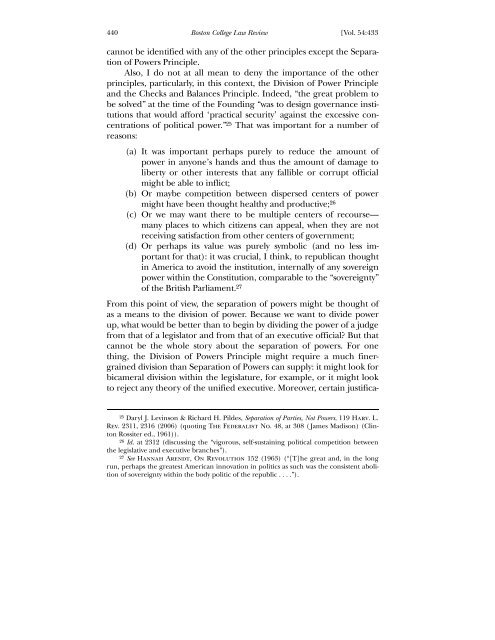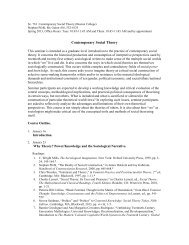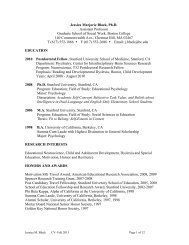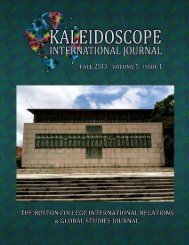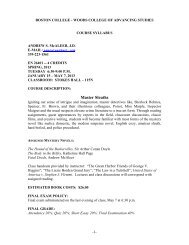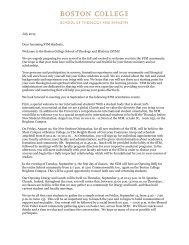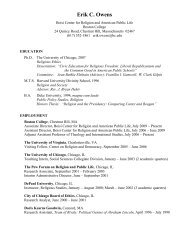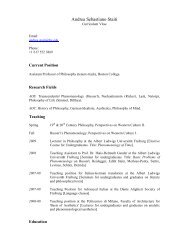separation of powers in thought and practice? - Boston College
separation of powers in thought and practice? - Boston College
separation of powers in thought and practice? - Boston College
You also want an ePaper? Increase the reach of your titles
YUMPU automatically turns print PDFs into web optimized ePapers that Google loves.
440 <strong>Boston</strong> <strong>College</strong> Law Review [Vol. 54:433<br />
cannot be identified with any <strong>of</strong> the other pr<strong>in</strong>ciples except the Separation<br />
<strong>of</strong> Powers Pr<strong>in</strong>ciple.<br />
Also, I do not at all mean to deny the importance <strong>of</strong> the other<br />
pr<strong>in</strong>ciples, particularly, <strong>in</strong> this context, the Division <strong>of</strong> Power Pr<strong>in</strong>ciple<br />
<strong>and</strong> the Checks <strong>and</strong> Balances Pr<strong>in</strong>ciple. Indeed, “the great problem to<br />
be solved” at the time <strong>of</strong> the Found<strong>in</strong>g “was to design governance <strong>in</strong>stitutions<br />
that would afford ‘practical security’ aga<strong>in</strong>st the excessive concentrations<br />
<strong>of</strong> political power.”25 That was important for a number <strong>of</strong><br />
reasons:<br />
(a) It was important perhaps purely to reduce the amount <strong>of</strong><br />
power <strong>in</strong> anyone’s h<strong>and</strong>s <strong>and</strong> thus the amount <strong>of</strong> damage to<br />
liberty or other <strong>in</strong>terests that any fallible or corrupt <strong>of</strong>ficial<br />
might be able to <strong>in</strong>flict;<br />
(b) Or maybe competition between dispersed centers <strong>of</strong> power<br />
might have been <strong>thought</strong> healthy <strong>and</strong> productive;26<br />
(c) Or we may want there to be multiple centers <strong>of</strong> recourse—<br />
many places to which citizens can appeal, when they are not<br />
receiv<strong>in</strong>g satisfaction from other centers <strong>of</strong> government;<br />
(d) Or perhaps its value was purely symbolic (<strong>and</strong> no less important<br />
for that): it was crucial, I th<strong>in</strong>k, to republican <strong>thought</strong><br />
<strong>in</strong> America to avoid the <strong>in</strong>stitution, <strong>in</strong>ternally <strong>of</strong> any sovereign<br />
power with<strong>in</strong> the Constitution, comparable to the “sovereignty”<br />
<strong>of</strong> the British Parliament.27<br />
From this po<strong>in</strong>t <strong>of</strong> view, the <strong>separation</strong> <strong>of</strong> <strong>powers</strong> might be <strong>thought</strong> <strong>of</strong><br />
as a means to the division <strong>of</strong> power. Because we want to divide power<br />
up, what would be better than to beg<strong>in</strong> by divid<strong>in</strong>g the power <strong>of</strong> a judge<br />
from that <strong>of</strong> a legislator <strong>and</strong> from that <strong>of</strong> an executive <strong>of</strong>ficial? But that<br />
cannot be the whole story about the <strong>separation</strong> <strong>of</strong> <strong>powers</strong>. For one<br />
th<strong>in</strong>g, the Division <strong>of</strong> Powers Pr<strong>in</strong>ciple might require a much f<strong>in</strong>ergra<strong>in</strong>ed<br />
division than Separation <strong>of</strong> Powers can supply: it might look for<br />
bicameral division with<strong>in</strong> the legislature, for example, or it might look<br />
to reject any theory <strong>of</strong> the unified executive. Moreover, certa<strong>in</strong> justifica-<br />
25 Daryl J. Lev<strong>in</strong>son & Richard H. Pildes, Separation <strong>of</strong> Parties, Not Powers, 119 Harv. L.<br />
Rev. 2311, 2316 (2006) (quot<strong>in</strong>g The Federalist No. 48, at 308 ( James Madison) (Cl<strong>in</strong>ton<br />
Rossiter ed., 1961)).<br />
26 Id. at 2312 (discuss<strong>in</strong>g the “vigorous, self-susta<strong>in</strong><strong>in</strong>g political competition between<br />
the legislative <strong>and</strong> executive branches”).<br />
27 See Hannah Arendt, On Revolution 152 (1963) (“[T]he great <strong>and</strong>, <strong>in</strong> the long<br />
run, perhaps the greatest American <strong>in</strong>novation <strong>in</strong> politics as such was the consistent abolition<br />
<strong>of</strong> sovereignty with<strong>in</strong> the body politic <strong>of</strong> the republic . . . .”).


